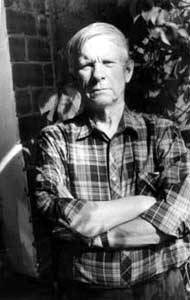
by Ky Krauthamer
in TOL 27 June 2003
Thousands of Belarusians--but few of their leaders--say goodbye to the country's most honored writer.
It looked like a state funeral, except that many of the state's top figures weren't there.
Crowds of mourners followed the coffin of Vasil Bykau, Belarus's most respected writer, as it moved through the streets of Minsk on 25 June. Later, as many as 30,000 people filed past the coffin to pay their last respects to the author, who died on 22 June of cancer. He was 79.
President Alyaksandr Lukashenka was not among the mourners, although he told TASS that he respected the late writer's dedication to Belarusian freedom and independence.
Bykau left Belarus in 1998 in protest against the Lukashenka regime's drive to seek union with Russia, promote the Russian language, and keep journalists and writers on a short leash.
 Bykau was born in Bychky, in what is now northeastern Belarus, in 1924. His experiences as a soldier fighting the German invasion and occupation during World War II marked nearly all of his subsequent writing. He rubbed official Soviet critics the wrong way with his existentially-charged portrayals of individuals crushed by powerful forces beyond their control. But it was his use of the Belarusian language and his vocal support for Belarusian culture that brought him the enmity of the Russophiles who dominate Belarus's official political and cultural circles.
Bykau was born in Bychky, in what is now northeastern Belarus, in 1924. His experiences as a soldier fighting the German invasion and occupation during World War II marked nearly all of his subsequent writing. He rubbed official Soviet critics the wrong way with his existentially-charged portrayals of individuals crushed by powerful forces beyond their control. But it was his use of the Belarusian language and his vocal support for Belarusian culture that brought him the enmity of the Russophiles who dominate Belarus's official political and cultural circles.
"I was born on Belarusian soil and my native language is Belarusian, so naturally I began to write, and still write, Belarusian literature in the Belarusian language. It was a very clear-cut and natural thing to do," Bykau said in an interview with TOL three years ago. "Lukashenka has simply rejected the Belarusian language and adopted a course of destroying Belarusian national culture."
After spending two years in Finland, the writer returned briefly to Minsk, but left for Germany in February 2000 at the invitation of the German PEN Club. He also spent time in the Czech Republic before returning to Belarus shortly before his death.
Bykau sometimes ran afoul of Soviet authorities for the uncompromising, often bleak tone of his writing, but his work was usually allowed to be published, and his position was such that his books were required reading for millions of Soviet schoolchildren. His works were translated into most major languages. Among the best-known are Sign of Misfortune, The Third Flare, and Alpine Ballad.
Beginning in the late 1980s, Bykau began working with several anti-communist, democratic opposition groups in Belarus. He also lent his support to the movement for increased use of the Belarusian language.
The post-Soviet Belarusian regime often blasted Bykau's politics and writings. In 1997, the State Committee on Printing refused permission for publication of his collection of short stories, The Wall. The book was later released by an independent publishing house. In 2002, the authorities banned publication of Bykau and several other writers because they "take part in political activities that represent international rather than national positions. They harm themselves and look funny," said Eduard Skobelev, chief of the presidential administration. "Regrettably," he added, "among them I must name our beloved Bykau."
Last December, after the Czech government granted him permission to remain in the country indefinitely, Bykau told the Belarusian opposition Website Charter 97 that he had not requested political asylum there. He had asked assistance from the government and then-President Vaclav Havel for the sake of his work and his poor health, and "any attempts to make a political act out of this are provocative and worthy of condemnation.
“Vasil Bykau is a citizen of the Republic of Belarus," he said. Ky Krauthamer is TOL’s culture editor.